- 18/08/21
Funerals can be difficult occasions. People can be conscious about doing or saying the right thing and may feel unsure about the correct funeral etiquette.
If you’re thinking about attending a funeral and don’t know what to expect, this guide will explain what happens. It also gives some useful suggestions about what you should do, bring, and say at the funeral. Our chapel attendants are always on hand to make sure things run smoothly and you receive the support you need.
The important thing is to remember that you are there to show your respects. You’re there to celebrate the life of a loved one and support the close friends and family. They will really appreciate your presence at a difficult time. The funeral is your opportunity to say goodbye to someone who was close to you.
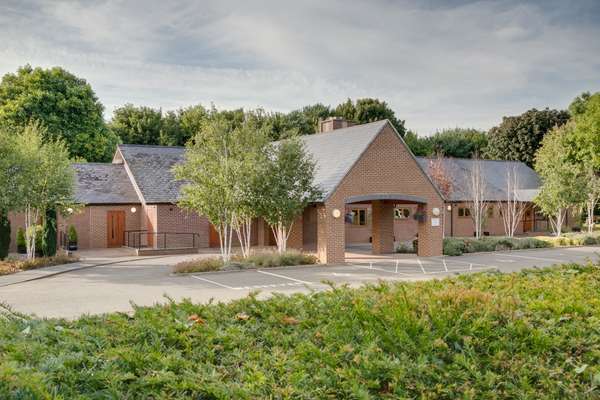
Knowing what to wear and what to bring to a funeral can be a challenge. You may not even be sure if you should attend in the first place. Here’s some handy advice and important information to bear in mind prior to the funeral service.
You won’t normally receive an invitation to a funeral and unless the family has stipulated that it’s private, it’s likely open to all those who wish to attend. So, should you go?
It sounds like a simple decision but occasionally, it can be a dilemma. You’re not sure whether you knew the person well enough. The location and date may be inconvenient for you, or you don’t know whether you’re in the right emotional state.
It’s a personal decision and no one should feel obliged to go if they’re not comfortable. However, if the deceased was someone special to you, their family will really appreciate you being there. Most will welcome the support of as many people who knew their loved one as possible. You’ll likely be glad you took advantage of the opportunity to say goodbye.
There’s no problem with taking children to a funeral, as long as it’s ok with the family. They can often make a sombre occasion happier and more uplifting.
With older children, you should carefully explain to them what’s going to happen and what the occasion is about. With babies, toddlers, or young children, it’s worth bringing a favourite cuddly toy or book. Be prepared to take them outside if they get noisy or disruptive.
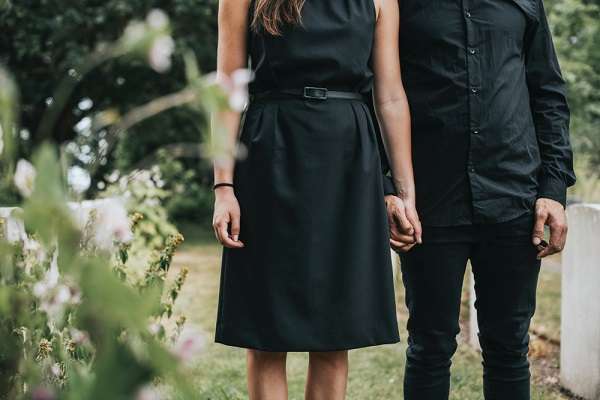
It’s generally expected that you dress smartly and sombrely for a funeral as a mark of respect. The normal dress code is black or dark-coloured clothes. Children should also be smartly dressed but comfortable.
Remember that churches and crematoriums can be cold in winter and you may be waiting outdoors for a while. Dress comfortably and make sure you’ll stay warm and dry in bad weather. You may also be unsure what to wear to a funeral in the summer. You should still dress in smart, dark clothing but choose lightweight fabrics like linen or cotton. Dresses or midi skirts with blouses can be a good option for women, while men can opt for short sleeve or polo shirts.
While smart and dark dress codes are still normal at many funerals, some now welcome less formal and more colourful clothing. A so-called ‘colourful funeral’ can be a positive way to symbolise a celebration of life. However, unless otherwise stated, casual clothing such as jeans and trainers should be avoided but this will depend on the funeral. If in doubt, you can always ask a family member for more information.
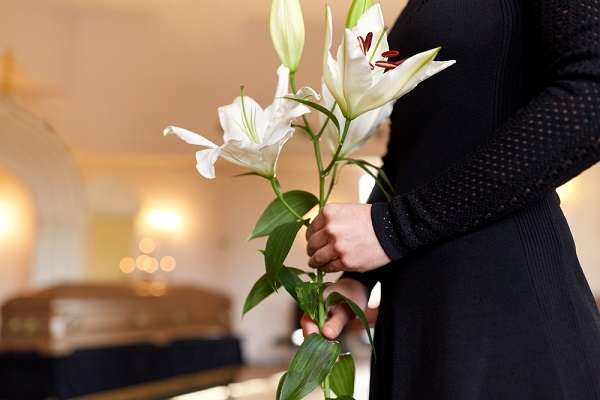
You won’t need much but here are a few items you may find useful:
In addition, you might want to prepare an answer if you’re asked for a special memory of the deceased. And remember, if you have a mobile phone with you, make sure you switch it off during the service or ceremony.
Flowers are a traditional and much-appreciated way of showing your respect. These can be as a traditional funeral wreath or less formal floral arrangement.
You can send them beforehand, to the home of the deceased’s family or to the funeral venue. Just make sure they arrive in time for the day of the funeral. It’s also fine to bring flowers with you on the day. There’s usually an area set aside for floral tributes.
When it comes to what to write on funeral flowers, you can add a simple card saying who they are from. This can be accompanied by a short message, perhaps ‘in loving memory’ or ‘forever in our thoughts’. Keep it simple and sincere.
Sometimes, the family will ask for a charity donation instead of flowers. It’s important to respect this. You should donate at least as much as you would have spent on flowers. There may also be a charity collection at the end of the service so remember to bring some money for this.
Funerals vary in length and there are no set rules. As an indication, a religious service, either at a church or crematorium will last between 30-45 minutes. A non-religious led by a celebrant will last between 15-20 minutes.
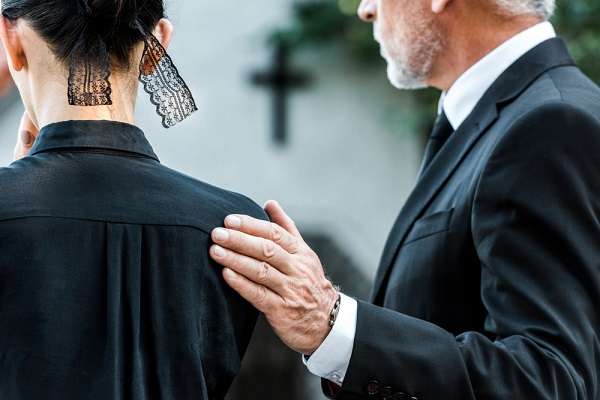
Funeral services are likely to be an emotional occasion. You may feel pressure to make sure you do and say the right thing. Remember that your presence alone will be appreciated by the family. A few genuine and sympathetic words can go a long way to providing comfort. Here are some things to bear in mind when it comes to funeral etiquette during the service.
Aim to be at the venue around 20 minutes before the scheduled time of the service. If travelling by car, it’s worth checking what parking is available.
For a church service, you should be there before the immediate family. This will give you time to find an appropriate seat and avoid the awkwardness of arriving while the service is underway. This particularly applies to people with mobility issues or if you are escorting someone who is elderly or frail.
At a crematorium, the family may lead the way into the chapel. Other guests will follow them in before taking their seats.
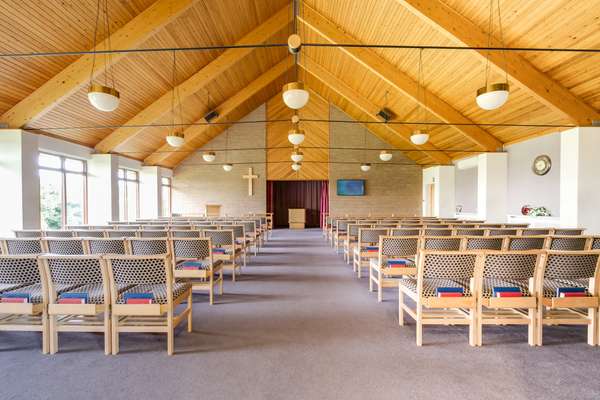
Funerals aren’t like weddings where it matters which side of the aisle you sit. You may be directed where to sit by a family member or the funeral director.
If not, just remember to leave the front rows for the immediate family. If it’s likely to be a small gathering, try to fill up the seats behind the family so as not leave a gap between them and the rest of the mourners.
It’s hard to know what to say to someone who has experienced serious loss. You may be worried about saying the wrong thing and upsetting them. Words can seem inadequate at such times and you may struggle to express your feelings.
Just remember that the bereaved will want to talk about their loved one and hear your particular memories of them. It can be very comforting to them that you acknowledge their loss. They will appreciate hearing that their loved one was very important to other people too.
A simple ‘I’m so sorry for your loss’ is a sincere and honest way of starting a conversation. Perhaps recall the last time you saw the deceased or share a treasured memory of them. ‘I am really going to miss them’ or ‘you and your family are in my thoughts’ are equally appropriate. And, if you’re not sure what to say, a warm handshake or hug can sometimes say more than words.
Expressions to avoid are things like ‘I know how you feel’ or bringing up other funerals you have attended. This may feel like you are trivialising their grief. Also, avoid cliches such as ‘he had a good life’, or ‘she’s in a better place now’, which will do little to comfort anyone.

The service is finished, and the formal part of the funeral is over. But that’s not the end. At most funerals, there will be a gathering after the service to celebrate the life of the deceased. This could be at a family home, a nearby pub, restaurant, or hall.
You may not have planned to go but often close family will ask you. If you don’t have the time or would prefer not to attend, it’s perfectly acceptable to politely turn down the invitation. However, many people find that attending the wake or celebration helps them come to terms with the loss of a loved one.
You will have the chance to share stories and memories with fellow mourners in a relaxed, informal atmosphere. Sometimes there’s a book where you can record a special memory or message of condolence. These can be a treasured keepsake for the family, so consider contributing if you feel comfortable doing so.
More and more people are now choosing to have a simple direct cremation with no frills and no fuss. These are typically organised directly with a funeral provider rather than through funeral directors.
At its simplest, the coffin is cremated with no mourners present. However, with some direct cremations, there is a simple ceremony at the crematorium organised by the family. This is normally a brief, intimate gathering of up to 20 family or friends. They will take a few minutes to remember their loved one, play a piece of music and perhaps say a few words.
You may be asked to attend this ceremony or a subsequent celebration, separate from the cremation. This can be anything from a memorial service, which may include scattering of the ashes, to an informal party or just a simple gesture such as donating to charity.
Under the most recent government guidelines, funerals can now take place. There are no limits on the number of people who can attend and the rules on face masks and social distancing have been relaxed. However, if you’re attending a funeral, be aware that you may be expected to wear a mask, respect social distancing, and avoid physical contact. Take your lead from the immediate family and follow their example.
Find here the latest government guidelines on funerals.